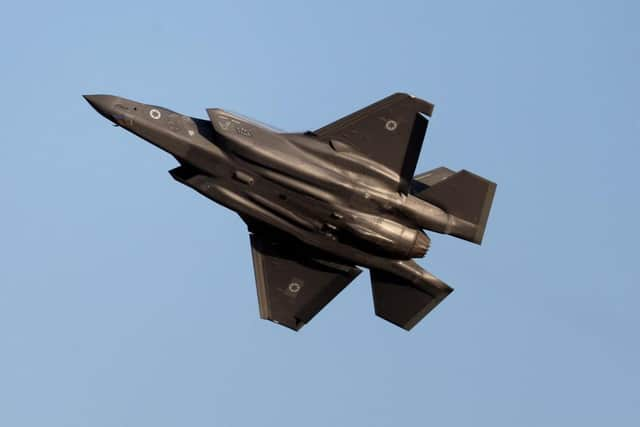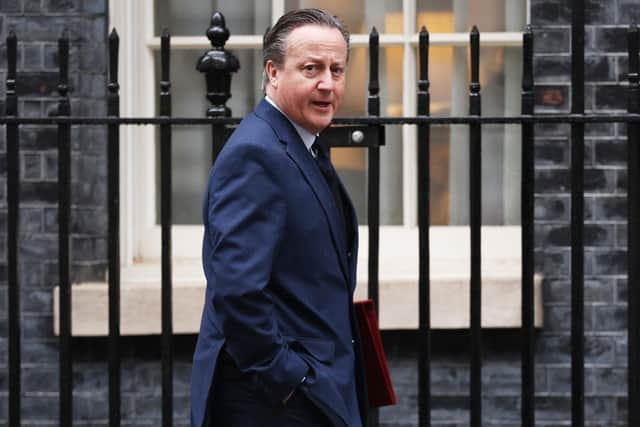Iran drone attack: What arms has the UK sold to Israel? Why has Rishi Sunak's government not stopped arms sales?
It has become a flashpoint of the increasingly bloody Israel-Hamas conflict, and one that has brought serious accusations of complicity and breaches of international law against the UK government.
For years now, the issue of arms exports to Israel has been a significant political and humanitarian issue, but as the conflict in Gaza rages on into a sixth month, it has become more heated than ever before.
Advertisement
Hide AdAdvertisement
Hide AdAccording to the UK government, some 0.02 per cent of Israel’s military imports came from the UK in 2022, with 114 granted export licences worth £42 million. One Tory MP, Brendan Clarke-Smith, has described that sum as “relatively small”, and when compared to the nations that provide the bulk of Israel’s foreign sourced weapons – the US, followed by Germany – that is true.
But over the course of less than a decade, the UK has still exported nearly half a billion pounds to Israel, meaning the sum is in no way insignificant. Indeed, in 2017, more than £200m worth of licences were approved, primarily to provide technology for military radars.
According to the Campaign Against Arms Trade, the UK has licenced £489m worth of arms to Israel since 2015, including £183m worth of ML22 licences (military technology), £126m worth of ML10 licences (aircraft, helicopters, drones), and £24m worth of ML4 licences (grenades, bombs, missiles, countermeasures).
The campaign group has raised concerns over the contributions made by UK firms to F-35 aircraft, which it says are being used by the Israeli military to target Gaza. It has also warned the actual level of exports since 2015 is likely to be “significantly higher”, given there have been nearly 50 open licences in that period, which allow for an unlimited quantity and value of exports. Indeed, there were ten open licences granted in 2022.
Any UK company that wishes to export military or dual-use goods – those that could have military or civilian applications – have to apply for a licence from the UK government to proceed, with an entity known as the Export Control Joint Unit, which sits within the Department for Business and Trade, responsible for arms export controls.


It assesses applications against the government’s own strategic export licensing criteria, which states licences should not be granted “if it determines there is a clear risk that the items might be used to commit or facilitate internal repression, or where we determine there is a clear risk that the items might be used to commit or facilitate a serious violation of international humanitarian law”.
While the government has approved licences as normal, several firms that have exported goods used by the Israeli military, such as Leonardo, Raytheon and BAE Systems, which all have presences in Scotland, have been targeted by protesters in recent months and years.
Those protests have intensified as the Israel Gaza war has wore on. In face of mounting pressure over its weapons trade with Israel, foreign secretary Lord Cameron said last week the UK’s position was in line with its international partners, pointing out that, so far, “no like-minded like-minded countries have taken the decision to suspend existing arms export licences to Israel”.
Advertisement
Hide AdAdvertisement
Hide AdHe said Israel remained a “vital defensive security partner to the UK,” and that its position on export licences was unchanged after the most recent review. Indeed, the bonds between the two countries were strengthened last month after the signing of a road map defining their bilateral co-operation until 2030. The agreement notes “significant scope to extend and deepen trade and investment,” while also maintaining their “extensive defence and security co-operation”.


However, the legal advice underpinning the government’s latest review has not been published, and that decision is coming under increasing pressure, with Labour calling for the almost quasi-judicial process to be open to scrutiny.
The party’s shadow foreign secretary, David Lammy, said the government’s position was “simply not good enough”, while Anas Sarwar, the Scottish Labour leader, has urged an immediate ban on arms sales, stating Israel had “clearly” breached international law.
On Friday, First Minister Humza Yousaf, also renewed his criticisms in a letter to Lord Ahmad, the UK Middle East minister. Mr Yousaf stressed that by continuing to arm Israel, the UK government was “in danger of being complicit in the killing of innocent civilians”. He said: “I find it difficult to comprehend that this continues to be the United Kingdom’s position against the backdrop of the International Court of Justice ruling; UN Security Council, General Assembly and Human Rights Council Resolutions; and countless UN officials’ statements about the catastrophic humanitarian situation in Gaza.”
With the Greens, Lib Dems and several Tory MPs also expressing grave concern about the ongoing arms exports, there is a groundswell of opposition to the government’s stance. And the pressure on Prime Minister Rishi Sunak’s administration to reconsider its position is not just coming from political circles.
Oxfam has said the UK’s decision to continue to selling arms to Israel is “illegal, immoral and inconsistent”. Earlier this month, meanwhile, four former court of appeal judges, more than 70 KCs, more than 100 partners and directors of law firms, and dozens of law professors, were among more than 750 signatories to a letter to Mr Sunak, warning him the UK is breaching international law by continuing to arm Israel.
Citing both the international court of justice’s conclusion that a plausible risk of genocide exists in Gaza, and the UK’s obligations under the 1948 Genocide Convention, the letter and legal opinion states “serious action” is needed to “avoid UK complicity in grave breaches of international law”.
If the UK government decides to suspend all, or some, export licences to Israel, it would not be setting a precedent. In 2009, Britain revoked export licences for weapons used by Israeli navy missile boats because of their use during attacks on Gaza.
Comments
Want to join the conversation? Please or to comment on this article.